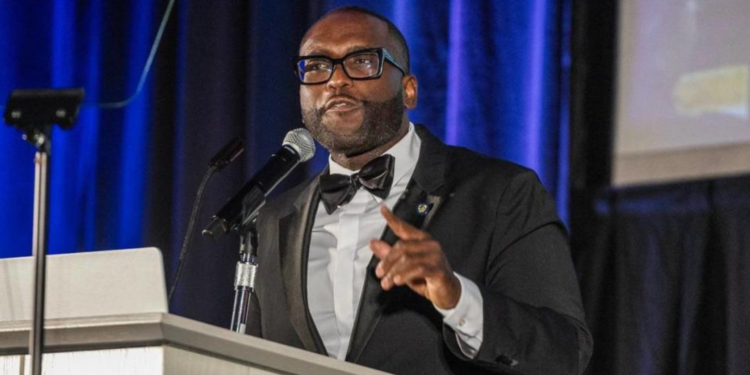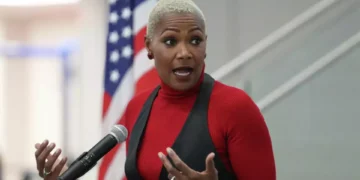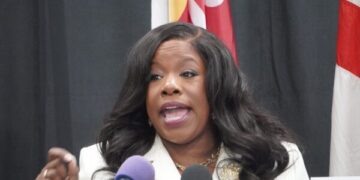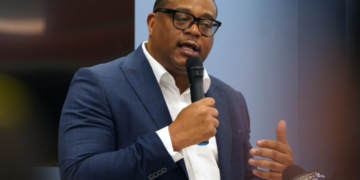Nov 28, 2024 Story by: Editor
Miami Gardens resident SarDeborah Wright, a member of the Miami-Dade Democratic Executive Committee, expressed frustration with the Democratic Party’s campaign strategy in Florida during the recent election cycle. She had decided months before Election Day to vote for Kamala Harris for president but felt the party wasted efforts trying to win over Hispanic Republicans instead of focusing on mobilizing Black voters.
“They’re not going to switch parties,” Wright said to the Miami Herald. “They keep putting a lot of money into going into areas of known Hispanic Republicans. They need to be putting more of their money into their base.”
Wright believes the Democratic National Committee did not adequately support initiatives aimed at energizing Black communities in South Florida, contributing to Donald Trump’s commanding victory over Harris in Florida and other swing states. Trump gained increased support from Hispanic voters, with 58% in Florida compared to 47% in 2020, and made gains among Black voters, securing 15% of their votes, five points higher than in 2020.
In Miami-Dade County, Trump’s influence helped Republicans achieve significant wins at various levels, including predominantly Black areas like Miami Gardens and North Miami. Wright attributed voter apathy to feelings of neglect among Black voters, noting that many feel overlooked after elections. “Once we realized after the election we don’t see them again, [many of us] stopped voting,” she said.
State Senator Shevrin Jones, chairman of the Miami-Dade Democratic Party and a Democratic National Committee member, acknowledged the party’s shortcomings in engaging Black voters year-round. “I think traditionally the Black community has been left out of the conversation when it comes to year-round engagement,” Jones stated. He noted improvements under DNC chairman Jaime Harrison but emphasized the need to recognize the diversity within the Black community.
Jones met with local Black pastors prior to the election who felt excluded from organizing efforts, promising to include them in future discussions. “I’m down to brainstorm and talk with anyone about how we can engage Black people moving forward,” he said.
Elizabeth Judd, an 83-year-old Fort Lauderdale resident and veteran Democratic delegate, described the lack of unity among South Florida Democrats as a significant issue. While she found the Democratic National Convention inspiring, she was disappointed by the disjointed efforts among local groups working toward Harris’ campaign. “We’re all working to get Democrats [in office], but we’re not working together,” she remarked.
Jones maintained that local Democratic leaders supported Harris to the best of their ability given their resources. Meanwhile, Christian Ulvert, senior political adviser to Miami-Dade Mayor Daniella Levine Cava, highlighted the mayor’s efforts to engage Black communities by opening campaign offices in majority-Black areas and building diverse campaign leadership teams.
Despite these efforts, some Black Democrats felt overlooked by Levine Cava’s endorsements. For example, her support for James Reyes in the sheriff’s race over John Barrow, a Black candidate, left some voters feeling slighted. Similarly, in the elections supervisor race, Levine Cava did not endorse, but her campaign director supported a Hispanic candidate over a Black candidate, causing further discontent.
Stanley Campbell, a Black Navy veteran and former Democratic Senate candidate, criticized the party for its lack of connection with Florida’s Black political community. He cited his exclusion during President Biden’s visit to Tampa as an example of the party’s disconnect. Campbell expressed concerns about how decisions, like Levine Cava’s support for a garbage incinerator near a predominantly Black area, reflect poorly on the party’s commitment to Black voters.
Democratic activist Leslie Wimes echoed these sentiments, accusing the party of sidelining Black voters while focusing on groups less likely to support them. Reflecting on past elections, she stated, “They want to reach out to mythical white working-class voters or a sector of Hispanic voters that will never vote for them.”
Wimes believed that Democratic women crossing over to vote for Trump, rather than Republican women supporting Harris, contributed to the election’s outcome. “I thought Republican women would cross over, [but] in the end, it was Democratic women that crossed over,” she said.
Despite the setbacks, Jones emphasized the importance of moving forward, drawing hope from Democratic supporters eager to regroup. “The glimmer of hope is people who are ready to get back to work,” he said. “People are dusting themselves off from what happened, and they’re making it clear that it’s back to work.” Source: Gazette Xtra

















